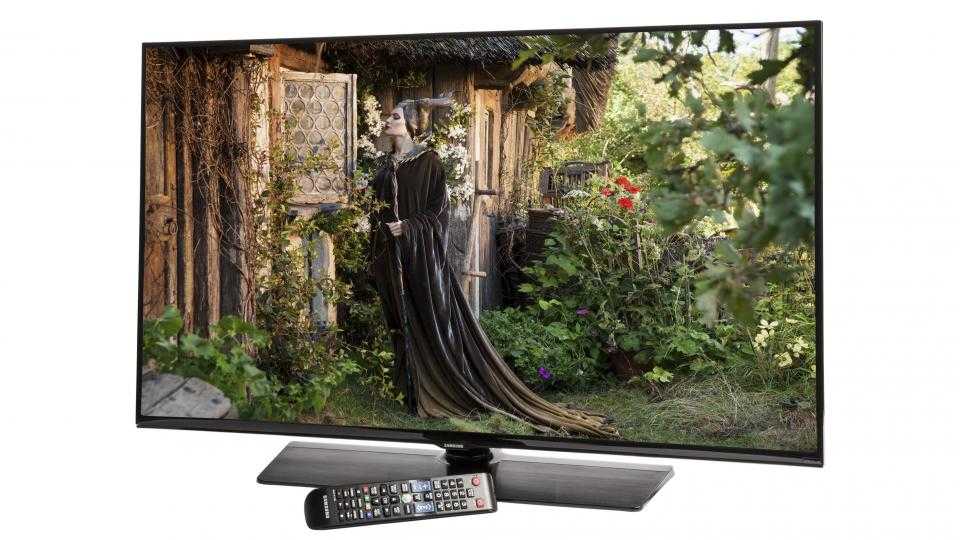With its large, flat stand, the UE40H5500 is far more muted and unassuming than the rest of Samsung's TV line-up. It certainly doesn't catch the eye like the metallic stands you'll find on higher-end models, but the bezels are still pleasingly slim and the set doesn't take up much room, making it a good choice for placing in a bedroom or small living room.
For this review we tested the 40in model in the H5500 range, but it's also available in 32in (UE32H5500) and 48in (UE48H5500) screen sizes. All models have identical specifications except for their dimensions and power usage. We're confident that image quality will be practically identical across the range.
You get a decent range of ports, including three SCART, component and composite video inputs, two USB ports, an Ethernet port, a 3.5mm headphone jack, an optical S/PDIF audio output and a CI slot. There are also three HDMI inputs, with one supporting ARC to minimise the number of wires coming out of your TV, should you connect a soundbar and Blu-ray player.
IMAGE QUALITY
Initial picture quality was good considering the price, with our colour calibrator measuring 90.6% of the sRGB colour gamut on the Standard picture mode. This is what we'd normally expect from an LCD panel, while sRGB colour gamut coverage was relatively even across all the primary colour groups. Blues and magenta were a little strong, but the H5500's only main area of weakness was its warmer colour coverage.
Brightness levels were a pleasant 259.82cd/m2, but this can easily be changed using the backlight settings in the basic picture settings if you want images a little dimmer. Contrast was also excellent at a massive 4995:1, providing our Blu-ray footage of Star Trek with plenty of detail in darker night scenes.
To try and improve the H5500's picture quality, we set the colour tone to Warm 2 in the Picture Options menu and adjusted the TV's white balance settings in the Advanced Settings menu. Leaving the R-Gain at 0, we altered the G-Gain to -25 and the B-Gain to -20. This increased the H5500's sRGB gamut coverage to a near-perfect 98.2%, widening its warm colour coverage and shortening its strong blues and magentas to better match the sRGB colour gamut boundaries.
This produced a more even, accurate picture, and it pushes the H5500's overall image quality above rival mid-range models like the Toshiba 47L6453DB and Panasonic’s Viera TX-42AS650 . This is outstanding for a TV of this price, especially when you consider the 48in model is currently available for around £450 - making the H5500 a much more attractive option for anyone looking to keep their budget below £500.
There are plenty of picture options to adjust the TV further if you feel the need, including basic contrast, brightness, sharpness, colour and tint settings, dynamic contrast, black tones, flesh tones, gamma, colour space and motion lighting. The latter will adjust the brightness according to what’s onscreen to help reduce power consumption. However, we felt this often had a negative effect on contrast levels and it made darker indoor scenes tough to see clearly, so we’d recommend keeping it turned off.
Unsurprisingly for a TV in this price range, the H5500 doesn’t come with Samsung’s Motion Plus frame interpolation, so you’ll have to make do with the occasional jerky camera movement. There is an option to turn on LED Clear Motion instead, which is meant to help make fast moving images appear clearer by controlling the LED backlight, but we found it made little difference to the overall smoothness of the picture. The TV doesn’t support 3D films either, but that’s no big loss in our eyes.

